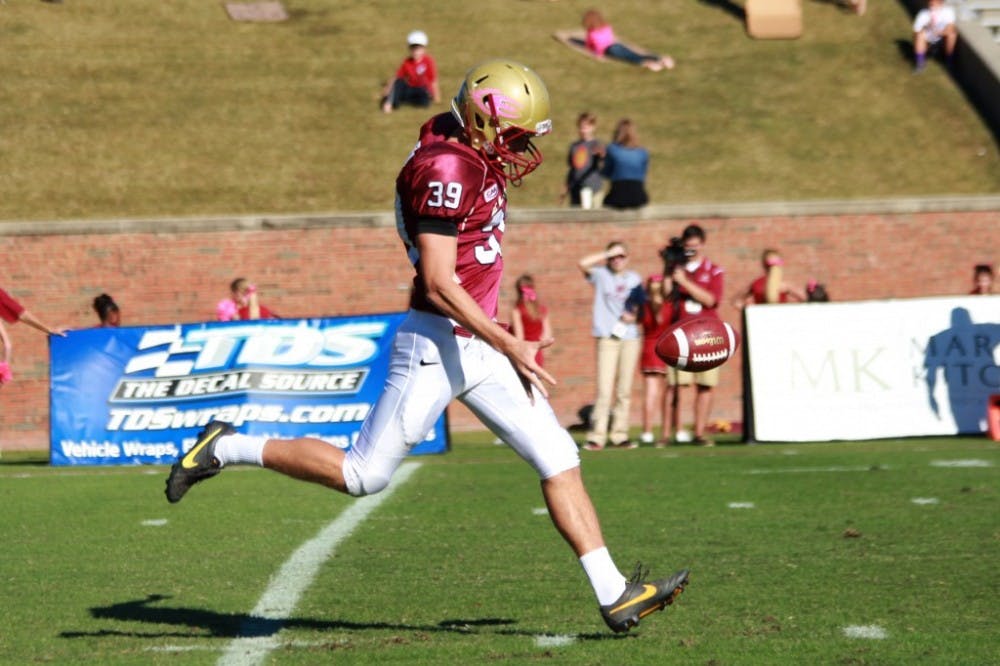Usually when the punter is noticed on the football field, it’s not a good thing.
The opposite held true for Elon University sophomore punter David Petroni in the team’s Oct. 25 loss to the University of Richmond.
On fourth-and-11, Petroni and Elon’s special teams set up in normal punting formation. Once Petroni took the snap, he was off to the races, scampering 13 yards for a first down.
The play call was based on something Elon head coach Rich Skrosky saw in Richmond’s punt coverage unit.
“You’re really looking for a numbers advantage,” Skrosky said. “Richmond was showing a two-deep look, which takes a guy out of the front, so they were a guy short on the front.”
For Petroni, a fake punt run was an unfamiliar play that became more comfortable after a week of practice.
“I’ve actually never run the ball,” he said. “I just ran left and did my best.”
Between the fake punt and seven others, fans in attendance got to see a lot of Petroni against the Spiders. Because Elon’s offense has struggled, Petroni has been on the field a lot this season.
Through eight games, only two punters in the Colonial Athletic Association had punted more than Petroni. Against Richmond, Petroni booted seven for an average of 42.6 yards.
His seven punts were a mix of traditional and lower trajectory, rugby-style punts. The Phoenix has used the rugby-style more regularly under Skrosky this season. Last year, under head coach Jason Swepson, Petroni only kicked a handful of rugby-style punts all season.
Elon operates under the belief that the rugby style punt has two major advantages: the odds of the opposing team returning the punt are significantly lower and the chance that the punt will strike an opposing player is higher, allowing Elon the chance to recover.
While both of these are valid reasons for mixing in the rugby-style, Petroni admits he’s struggled with the drops on his punts at times, a part of his game he has started to polish.
“At the start of the season, I was disappointed,” Petroni said. “I had a problem where my drop was kind of floating in on me which causes shorter, lower hang time punts. I didn’t start out the way I know I can. But I really focused in, made a couple of adjustments, fixed what I was doing and I’m hitting the ball really well now.”
When practice wasn’t enough to get it right, Petroni performed drills in his apartment.
Even with Petroni’s struggles, Skrosky has shown a commitment to mixing up the punts, citing the net yardage of the rugby-style as an advantage.
“The mix-up is helping,” Skrosky said. “Now that we have both in, it’s really hard for a team to gang up on the kick point.”
Though Petroni is much more experienced with the traditional punts, he sees no reason not to succeed with the rugby style.
“I try and set the expectation pretty high,” Petroni said. “I like to think of myself as my hardest critic. I know if it’s a bad hit even if some guys are telling me it’s a good hit. I know it could be better. I think I try to be hard on myself. It’s better to be hard on myself than say, ‘OK, that’s good enough.’”
For Elon’s special teams unit, it may be a blessing in disguise that the offense hasn’t been able to sustain drives. Less offensive success means more chances for Petroni to work on perfecting both punting styles.
“Obviously it’s not a great thing to punt more,” Petroni said. “But from my standpoint, I get some good reps. It’s always good to snap with a live rush coming at me, so it’s good practice.”


